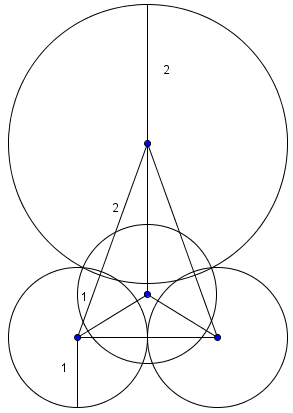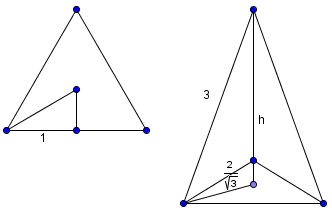Difference between revisions of "2004 AMC 12A Problems/Problem 22"
m (→Solution 1) |
Kilobyte144 (talk | contribs) (→Solution 1) |
||
| Line 8: | Line 8: | ||
== Solution 1== | == Solution 1== | ||
| − | The height from the center of the bottom sphere to the plane is <math>1</math>, and from the center of the top sphere to the tip is <math>2</math>. | + | The height from the center of the bottom [[sphere]] to the [[plane]] is <math>1</math>, and from the center of the top sphere to the tip is <math>2</math>. |
[[Image:2004_AMC12A-22a.png]] | [[Image:2004_AMC12A-22a.png]] | ||
| − | We now need the vertical height of the centers. If we connect centers, we get a rectangular [[pyramid]] with an [[equilateral triangle]] base. The distance from the vertex of the equilateral triangle to its [[centroid]] can be found by <math>30\text-60\text-90 \triangle</math>s to be <math>\frac{2\sqrt{3}}{3}</math>. | + | We now need the [[vertical]] [[height]] of the [[centers]]. If we connect centers, we get a [[rectangular]] [[pyramid]] with an [[equilateral triangle]] [[base]]. The distance from the vertex of the equilateral triangle to its [[centroid]] can be found by <math>30\text-60\text-90 \triangle</math>s to be <math>\frac{2\sqrt{3}}{3}</math>. |
[[Image:2004_AMC12A-22b.png]] | [[Image:2004_AMC12A-22b.png]] | ||
| − | By the [[Pythagorean Theorem]], we have <math>\left(\frac{2}{\sqrt{3}}\right)^2 + h^2 = 3^2 \Longrightarrow h = \frac{\sqrt{69}}{3}</math>. Adding the heights up, we get <math>\frac{\sqrt{69}}{3} + 1 + 2 \Rightarrow 3+\frac{\sqrt{69}}{3}, or \boxed{B}</math> | + | By the [[Pythagorean Theorem]], we have <math>\left(\frac{2}{\sqrt{3}}\right)^2 + h^2 = 3^2 \Longrightarrow h = \frac{\sqrt{69}}{3}</math>. Adding the heights up, we get <math>\frac{\sqrt{69}}{3} + 1 + 2 \Rightarrow 3+\frac{\sqrt{69}}{3}</math>, or <math>\boxed{B}</math> |
==Solution 2== | ==Solution 2== | ||
Latest revision as of 15:36, 10 January 2025
- The following problem is from both the 2004 AMC 12A #22 and 2004 AMC 10A #25, so both problems redirect to this page.
Problem
Three mutually tangent spheres of radius ![]() rest on a horizontal plane. A sphere of radius
rest on a horizontal plane. A sphere of radius ![]() rests on them. What is the distance from the plane to the top of the larger sphere?
rests on them. What is the distance from the plane to the top of the larger sphere?
![]()
Solution 1
The height from the center of the bottom sphere to the plane is ![]() , and from the center of the top sphere to the tip is
, and from the center of the top sphere to the tip is ![]() .
.
We now need the vertical height of the centers. If we connect centers, we get a rectangular pyramid with an equilateral triangle base. The distance from the vertex of the equilateral triangle to its centroid can be found by ![]() s to be
s to be ![]() .
.
By the Pythagorean Theorem, we have ![]() . Adding the heights up, we get
. Adding the heights up, we get ![]() , or
, or ![]()
Solution 2
Connect the centers of the spheres. Note that the resulting prism is a tetrahedron with base lengths of 2 and side lengths of 3. Drop a height from the top of the tetrahedron to the centroid of its equilateral triangle base. Using the Pythagorean Theorem, it is easy to see that the circumradius of the base is ![]() . We can use PT again to find the height of the tetrahedron given its base's circumradius and it's leg lengths. Finally, we add the distance from the top of the tetrahedron to the top of the sphere of radius 2 and the distance from the bottom of the prism to the ground to get an answer of
. We can use PT again to find the height of the tetrahedron given its base's circumradius and it's leg lengths. Finally, we add the distance from the top of the tetrahedron to the top of the sphere of radius 2 and the distance from the bottom of the prism to the ground to get an answer of  .
.
Video Solution
~IceMatrix
See also
| 2004 AMC 12A (Problems • Answer Key • Resources) | |
| Preceded by Problem 21 |
Followed by Problem 23 |
| 1 • 2 • 3 • 4 • 5 • 6 • 7 • 8 • 9 • 10 • 11 • 12 • 13 • 14 • 15 • 16 • 17 • 18 • 19 • 20 • 21 • 22 • 23 • 24 • 25 | |
| All AMC 12 Problems and Solutions | |
| 2004 AMC 10A (Problems • Answer Key • Resources) | ||
| Preceded by Problem 24 |
Followed by Last Question | |
| 1 • 2 • 3 • 4 • 5 • 6 • 7 • 8 • 9 • 10 • 11 • 12 • 13 • 14 • 15 • 16 • 17 • 18 • 19 • 20 • 21 • 22 • 23 • 24 • 25 | ||
| All AMC 10 Problems and Solutions | ||
The problems on this page are copyrighted by the Mathematical Association of America's American Mathematics Competitions. ![]()











